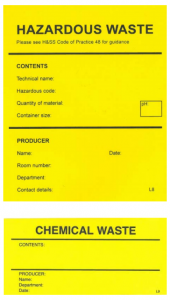Hazardous Waste
Waste is defined as hazardous if it contains materials or substances that are harmful to human health or the environment.
The University is considered to be a hazardous waste 'producer' under the Hazardous Waste Regulations 2005. Therefore the correct procedures and facilities need to be in place to ensure we are managing our waste appropriately, legally and safely.
Safety Code of Practice 48: Hazardous Waste - This University Code of Practice provides information about what is defined as hazardous waste plus the correct management and disposal processes that need to be applied at the University of Reading.
Technical Guidance WM3: Waste Classification - This Government document provides guidance on the classification and assessment of waste. It lists the EWC codes that are needed to describe waste correctly before disposal.
Consignment Notes are required to be produced when hazardous waste is moved from one premises to another. The note must accompany the waste during transport and be completed correctly. A copy of the note must be stored on site for 3 years and be available when requested. More information about consignment notes is available in the Safety Code of Practice 48: Hazardous Waste, on The Compliance People website and in this short 20 min video below:
An Introduction to Consignment Notes:
- Hazardous waste must be segregated from non-hazardous waste and be stored securely without risk to human health and the environment.
- Hazardous waste must only be transferred to a University approved waste carrier who has the appropriate waste carriers licence.
- The waste hierarchy principles must be applied (where practicable) in order to minimise the quantities of hazardous waste generated
- Please read the Safety Code of Practice 48: Hazardous Waste for more details on more specific procedures.
Chemical Waste
Two bulk collections of chemical waste are arranged by Sustainability Services each year during Spring and Autumn.
Science Schools should submit their lists of chemical wastes for disposal to Technical Services - for more information please contact Paul Willis, Logistics Division Manager, Technical Services (p.h.willis@reading.ac.uk ). Professional Services and non-science Schools should contact Sustainability Services (waste@reading.ac.uk).
 Accurate identification and listing is a requirement of this service. Please make sure your waste is labelled with the correct information using the yellow hazardous waste labels.
Accurate identification and listing is a requirement of this service. Please make sure your waste is labelled with the correct information using the yellow hazardous waste labels.
The cost of the service is charged back to departments according to the types and quantities of waste involved.
The disposal of chemicals is expensive! The disposal of 'unknown' chemicals is even more expensive!! Please keep track of chemicals and label containers with their contents. A lab inventory system is recommended.
Ad-hoc collections are also available, please contact your local Health & Safety Coordinator or email waste@reading.ac.uk for information or for a copy of the hazardous waste return form template.
Biological Waste
Please contact the Biological and Scientific Safety Adviser or your local Health & Safety Coordinator for more information about the safe disposal of biological waste.
See also Safety Code of Practice 14: Part 7 - Clinical and Biological Waste
Radioactive Waste
Radiation Safety is overseen by Health and Safety Services. Please contact the Scientific Safety Advisor (safety@reading.ac.uk or Ext.8888) or your local Health & Safety Co-ordinator.
See also Radiation Safety Pages on the Health and Safety Services website.
